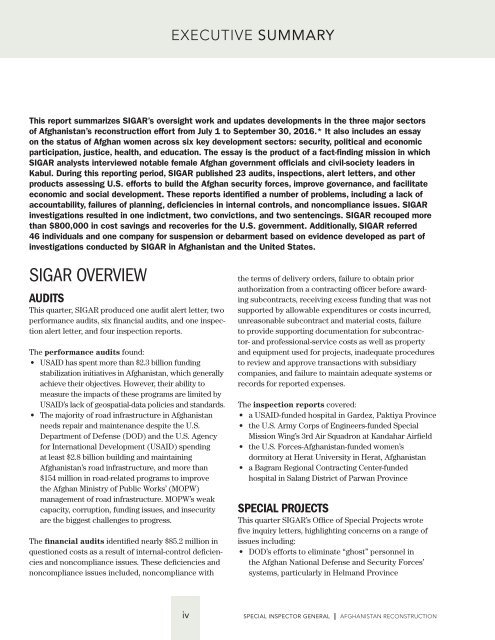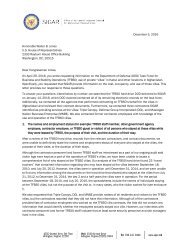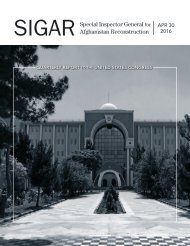SIGAR
2016-10-30qr
2016-10-30qr
You also want an ePaper? Increase the reach of your titles
YUMPU automatically turns print PDFs into web optimized ePapers that Google loves.
EXECUTIVE SUMMARY<br />
This report summarizes <strong>SIGAR</strong>’s oversight work and updates developments in the three major sectors<br />
of Afghanistan’s reconstruction effort from July 1 to September 30, 2016.* It also includes an essay<br />
on the status of Afghan women across six key development sectors: security, political and economic<br />
participation, justice, health, and education. The essay is the product of a fact-finding mission in which<br />
<strong>SIGAR</strong> analysts interviewed notable female Afghan government officials and civil-society leaders in<br />
Kabul. During this reporting period, <strong>SIGAR</strong> published 23 audits, inspections, alert letters, and other<br />
products assessing U.S. efforts to build the Afghan security forces, improve governance, and facilitate<br />
economic and social development. These reports identified a number of problems, including a lack of<br />
accountability, failures of planning, deficiencies in internal controls, and noncompliance issues. <strong>SIGAR</strong><br />
investigations resulted in one indictment, two convictions, and two sentencings. <strong>SIGAR</strong> recouped more<br />
than $800,000 in cost savings and recoveries for the U.S. government. Additionally, <strong>SIGAR</strong> referred<br />
46 individuals and one company for suspension or debarment based on evidence developed as part of<br />
investigations conducted by <strong>SIGAR</strong> in Afghanistan and the United States.<br />
<strong>SIGAR</strong> OVERVIEW<br />
AUDITS<br />
This quarter, <strong>SIGAR</strong> produced one audit alert letter, two<br />
performance audits, six financial audits, and one inspection<br />
alert letter, and four inspection reports.<br />
The performance audits found:<br />
• USAID has spent more than $2.3 billion funding<br />
stabilization initiatives in Afghanistan, which generally<br />
achieve their objectives. However, their ability to<br />
measure the impacts of these programs are limited by<br />
USAID’s lack of geospatial-data policies and standards.<br />
• The majority of road infrastructure in Afghanistan<br />
needs repair and maintenance despite the U.S.<br />
Department of Defense (DOD) and the U.S. Agency<br />
for International Development (USAID) spending<br />
at least $2.8 billion building and maintaining<br />
Afghanistan’s road infrastructure, and more than<br />
$154 million in road-related programs to improve<br />
the Afghan Ministry of Public Works’ (MOPW)<br />
management of road infrastructure. MOPW’s weak<br />
capacity, corruption, funding issues, and insecurity<br />
are the biggest challenges to progress.<br />
The financial audits identified nearly $85.2 million in<br />
questioned costs as a result of internal-control deficiencies<br />
and noncompliance issues. These deficiencies and<br />
noncompliance issues included, noncompliance with<br />
the terms of delivery orders, failure to obtain prior<br />
authorization from a contracting officer before awarding<br />
subcontracts, receiving excess funding that was not<br />
supported by allowable expenditures or costs incurred,<br />
unreasonable subcontract and material costs, failure<br />
to provide supporting documentation for subcontractor-<br />
and professional-service costs as well as property<br />
and equipment used for projects, inadequate procedures<br />
to review and approve transactions with subsidiary<br />
companies, and failure to maintain adequate systems or<br />
records for reported expenses.<br />
The inspection reports covered:<br />
• a USAID-funded hospital in Gardez, Paktiya Province<br />
• the U.S. Army Corps of Engineers-funded Special<br />
Mission Wing’s 3rd Air Squadron at Kandahar Airfield<br />
• the U.S. Forces-Afghanistan-funded women’s<br />
dormitory at Herat University in Herat, Afghanistan<br />
• a Bagram Regional Contracting Center-funded<br />
hospital in Salang District of Parwan Province<br />
SPECIAL PROJECTS<br />
This quarter <strong>SIGAR</strong>’s Office of Special Projects wrote<br />
five inquiry letters, highlighting concerns on a range of<br />
issues including:<br />
• DOD’s efforts to eliminate “ghost” personnel in<br />
the Afghan National Defense and Security Forces’<br />
systems, particularly in Helmand Province<br />
iv<br />
SPECIAL INSPECTOR GENERAL I AFGHANISTAN RECONSTRUCTION




